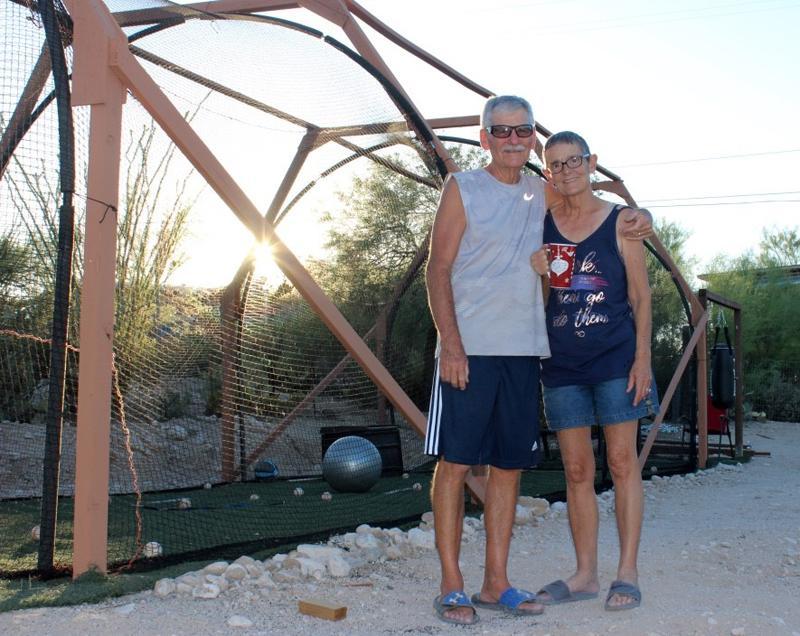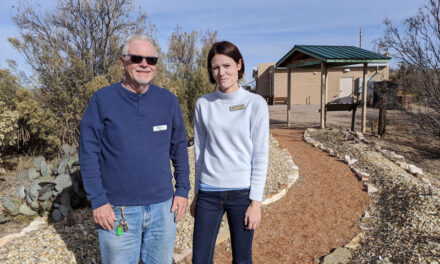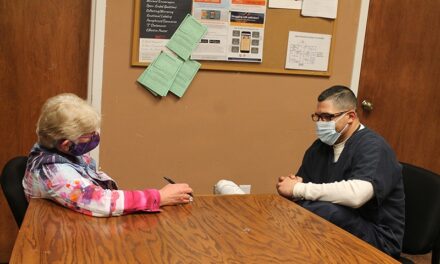About eight years ago, while Miriam and I sat in the office of an Albuquerque neurologist, she took notice of the many people severely brain-damaged at birth or by accident as they ambulated the best they could by wheelchair or walker.
“You know, there’s always someone who has it worse,” Miriam said.
It was a typical statement of Miriam’s world view: empathy of other’s suffering while appreciating her good fortune.
In less than an hour, Miriam received her own death sentence.

Submitted photo
Curt and Miriam Gustafson stands in front of a batting cage Curt built on his Tucson property. Curt, a former News-Bulletin reporter, has immersed himself into training for and playing senior baseball as a relief valve for the constant pressure of being a caregiver for his wife.
The visit to the neurologist was a long time coming. At least three years prior, Miriam had begun showing strong signs of memory loss. While I would be preparing our breakfast for another workday, Miriam, at the time a tenured English professor at UNM-Valencia, began to ask me the same question — over and over.
“I just answered that,” I would respond with exasperation.
“Well, tell me again,” she would respond.
These events marked — literally — the first times even a hint anger ever intruded upon our interactions. Both of us were involved in previous unsuccessful marriages. When we met, we immediately fell deeply in love. I admired so many of her qualities — her lack of anger, her quick wit, an innate wisdom that permeated our relationship that helped me grow as a person.
As the neurologist administered the screening test, it became apparent that something was dreadfully wrong. She was unable to provide an answer when she was shown a picture of an abacus. When shown a picture of a rhinoceros, she identified it as a hippopotamus. After the neurologist corrected her, he showed her the same picture moments later.
“Hippopotamus,” was her answer.
Among other things, she was unable to perform was subtracting seven from 100.
“I think you have a touch of Alzheimer’s,” the neurologist said, with an air of apology.
As we were driving home, Miriam broke her silence by saying that having Alzheimer’s disease carries a “social stigma,” and made me promise never to tell a soul, a promise I have broken at times during the intervening years. But it was a momentous decision because it allowed her not to acknowledge the disease.
Meanwhile, I received a call from a university official telling me that Miriam would have to retire because of her memory loss. So Miriam retired. And so did I, realizing that being her caregiver would become a full-time job.
So while I became the exclusive caregiver for an Alzheimer’s disease sufferer, it made it all the more important for me to take care of myself. After all, according to the Alzheimer’s Association, in 40 percent of cases, the caregiver precedes in death the person who is being cared for.
We decided to move to Tucson, where we could receive family support. We purchased a home on an acre of land, which ached for creative development. I became consumed in physically, emotionally and creatively developing the property. I was astounded by how creative I became; the property began vibrating because of the changes.
I am also a baseball freak, so I located a senior baseball league and joined a team. This has progressed into my participation in a 70-and-over baseball world series on Phoenix-area spring training fields and stadiums.
This is all well and good, but I seem to be in a tug-of-war between my personal pursuits and the demands of a wife suffering from Alzheimer’s disease. Miriam is now 100 percent dependent upon me. All of her daily decisions must come through me. I find it increasingly difficult to find private time; she almost seems to be stalking me.
I occasionally become exasperated and lash out at her, then immediately hate myself for it. She simply can’t help it.
Miriam and I will have been married 27 years later in this year. I calculate that well over one-third of that time she has manifested symptoms of Alzheimer’s disease. So her disease has become my most common frame of reference I have for her.
I have to look at old photos to remind myself of all of her wonderful qualities that led me to marry her because she is definitely not the woman I married. A monster has sucked all of those qualities out of her and spit them out, never to be seen again.
My best guess is that Miriam is in the early part of the final stage of Alzheimer’s disease. This once voracious reader can no longer read. She cannot perform any of the once-easy tasks, such as dish-washing and clothes washing. She has asked for directions to a bathroom in her own home.
Every morning we walk our dog. One morning she decided it was chilly, so she went inside to get a stocking cap, and returned with a wet dish rag.
The Alzheimer’s Association says this is normal, but I still feel guilt when I have a strong wish for it to be done with.
I’m now 77 years old. I’m healthy and wanting to experience a life after the nightmare is over.
Will it happen?
















